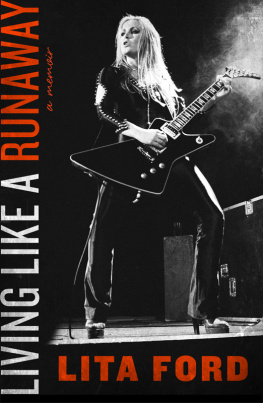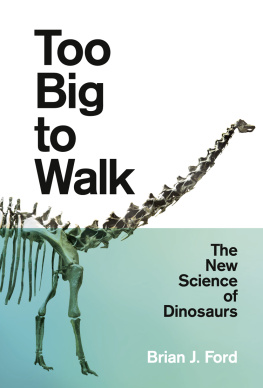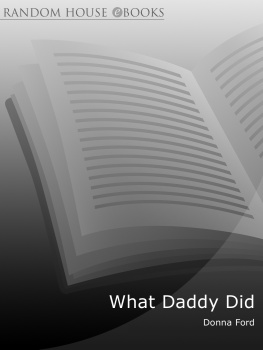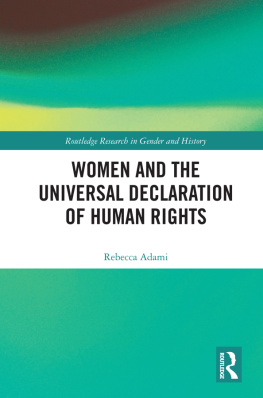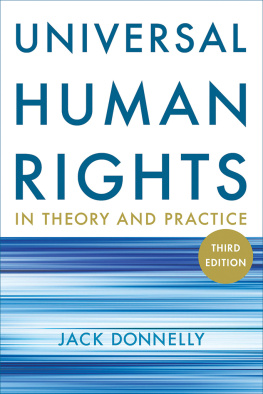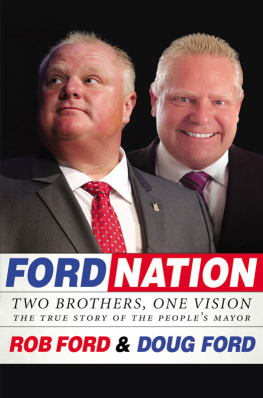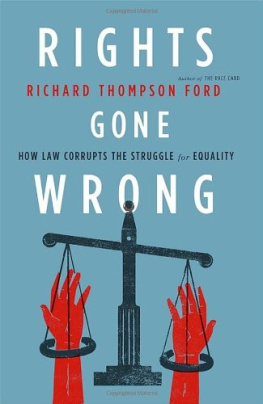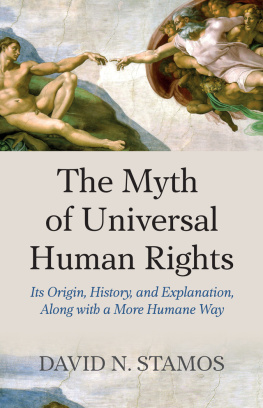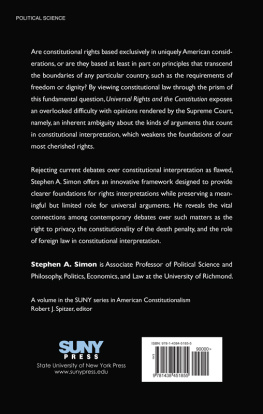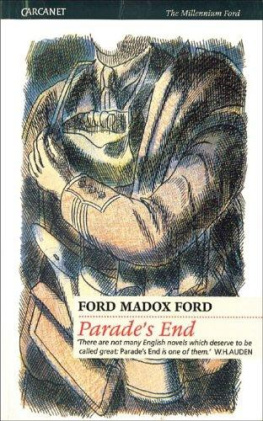Ford - Universal Rights Down to Earth
Here you can read online Ford - Universal Rights Down to Earth full text of the book (entire story) in english for free. Download pdf and epub, get meaning, cover and reviews about this ebook. year: 2011, publisher: Norton, genre: Politics. Description of the work, (preface) as well as reviews are available. Best literature library LitArk.com created for fans of good reading and offers a wide selection of genres:
Romance novel
Science fiction
Adventure
Detective
Science
History
Home and family
Prose
Art
Politics
Computer
Non-fiction
Religion
Business
Children
Humor
Choose a favorite category and find really read worthwhile books. Enjoy immersion in the world of imagination, feel the emotions of the characters or learn something new for yourself, make an fascinating discovery.

- Book:Universal Rights Down to Earth
- Author:
- Publisher:Norton
- Genre:
- Year:2011
- Rating:3 / 5
- Favourites:Add to favourites
- Your mark:
- 60
- 1
- 2
- 3
- 4
- 5
Universal Rights Down to Earth: summary, description and annotation
We offer to read an annotation, description, summary or preface (depends on what the author of the book "Universal Rights Down to Earth" wrote himself). If you haven't found the necessary information about the book — write in the comments, we will try to find it.
Ford: author's other books
Who wrote Universal Rights Down to Earth? Find out the surname, the name of the author of the book and a list of all author's works by series.
Universal Rights Down to Earth — read online for free the complete book (whole text) full work
Below is the text of the book, divided by pages. System saving the place of the last page read, allows you to conveniently read the book "Universal Rights Down to Earth" online for free, without having to search again every time where you left off. Put a bookmark, and you can go to the page where you finished reading at any time.
Font size:
Interval:
Bookmark:
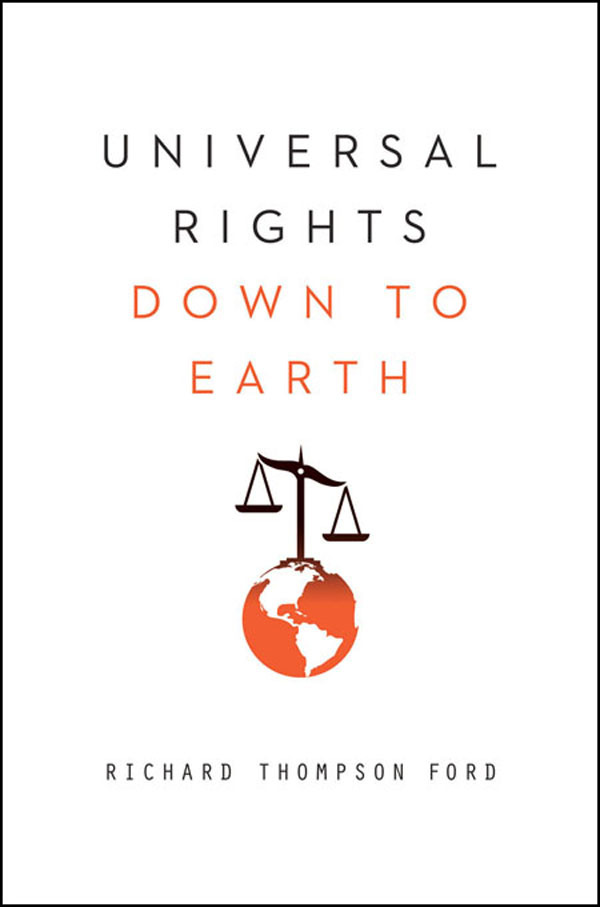
AMNESTY INTERNATIONAL
GLOBAL ETHICS SERIES
General Editor: Kwame Anthony Appiah
In December 1948, the UN General Assembly adopted the United Nations Universal Declaration of Human Rights and thereby created the fundamental framework within which the human rights movement operates. That declarationand the various human rights treaties, declarations, and conventions that have followedare given life by those citizens of all nations who struggle to make reality match those noble ideals.
The work of defending our human rights is carried on not only by formal national and international courts and commissions but also by the vibrant transnational community of human rights organizations, among which Amnesty International has a leading place. Fifty years on, Amnesty has more than three million members, supporters, and subscribers in 150 countries, committed to campaigning for the betterment of peoples across the globe.
Effective advocacy requires us to use our minds as well as our hearts; and both our minds and our hearts require a global discussion. We need thoughtful, cosmopolitan conversation about the many challenges facing our species, from climate control to corporate social responsibility. It is that conversation that the Amnesty International Global Ethics Series aims to advance. Written by distinguished scholars and writers, these short books distill some of the most vexing issues of our time down to their clearest and most compelling essences. Our hope is that this series will broaden the set of issues taken up by the human rights community while offering readers fresh new ways of thinking and problem-solving, leading ultimately to creative new forms of advocacy.
FORTHCOMING AUTHORS:
Jonathan Wolff
John Broome
Philip Pettit
John Ruggie
Sheila Jasanoff
Martha Minow
ALSO BY RICHARD THOMPSON FORD
Rights Gone Wrong:
How Law Ignores Common Sense and Undermines Social Justice
The Race Card: How Bluffing About Bias Makes Race Relations Worse
Racial Culture: A Critique
UNIVERSAL RIGHTS
DOWN TO EARTH
Richard Thompson Ford

W. W. NORTON & COMPANY
NEW YORK LONDON
To Marlene: who proves that idealism
and pragmatism can peacefully coexist.
CONTENTS
INTRODUCTION
T he United Nations Convention on the Elimination of All Forms of Discrimination against Women (CEDAW) requires signatory nations to incorporate the principle of equality of men and women in their legal system, abolish all discriminatory laws and... ensure elimination of all acts of discrimination against women by persons, organizations or enterprises. This is an ambitious agenda, encompassing law reform and the regulation of private parties. Nonetheless, a surprising number of nationsincluding many without robust civil rights traditions and with cultures of deep-seated and pervasive gender hierarchy, such as Afghanistan and Saudi Arabiahave ratified it.
To the chagrin of feminists and human rights advocates, the United States has not ratified CEDAW, a distinction it shares only with the Vatican, Iran, Somalia, Sudan, and a few small island nations. Among the nations that have ratified CEDAW are Yemen, Burma (Myanmar), North Korea, and Saudi Arabia. This should be somewhat embarrassing for the putative leader of the free world, but, as a practical matter, what does it mean? Is the day-to-day life of the typical woman in, say, Saudi Arabia better than that of a typical American woman? The United States has not come close to eliminating all forms of discrimination against women, but hasnt it done a better job than Afghanistanwhere girls are routinely threatened with violence for daring to attend schoolor Saudi Arabia? Saudi Arabia insists that women enjoy the same rights as men under its laws, but womenand only womenare required to wear veils and shoul der-to-toe covering when in public, are forbidden to drive automobiles, and are regularly refused service in restaurants unless accompanied by a man. Saudi law provides that sons receive double the inheritance of their sisters. By contrast, the United States has some of the worlds most comprehensive and well-enforced laws against sex discrimination, and American women enjoy more personal freedom and opportunity than do women in much of Europe and most of the rest of the world. American civil rights laws are far from perfect, but the United States has eliminated most formal legal distinctions based on sex, and American businesses face the threat of costly litigation if they discriminate against women. Should it worry us that human rights commitments correspond so poorly to actual practices?
Despite this and many other conspicuous gaps between ideal and implementation, universal human rights represent the dominant utopianism of our era. Where previous generations put their hopes in spiritual enlightenment, political revolution, or technological emancipation, todays idealists look with anticipation to a world governed by human rightsa moral utopia of law. What would lead us to hope that the expression of a commitment to human rights would make a practical difference in the lives of human beings worldwideregardless of the political and economic institutions they encounter? For much of human history, few thought so. Expressions of human rights, in one form or another, can be found at least as early as the great national revolutions in the eighteenth century, and some would argue that many of the earliest laws included human rights, albeit traveling under other names. But these earlier expressions of universal rightsthe most dramatic of which was Frances Declaration of the Rights of Mandid not imagine that human rights would change the behavior of governments as a practical matter, even if they insisted on rights that transcended states and sovereigns as a conceptual matter. The universal nature of rights was a reason for the overthrow of unjust governmentsnot an occasion for limiting their abuses. The rights of man were inextricably bound to the rights of the citizen and to the nature of government. Universal rights justified replacing oppressive regimes with new forms of government that would respect rights by design: monarchies and aristocracies, with republics and democracies. Even after the horrors of World War II, to which many attribute the birth of modern human rights, those concerned with social justice looked to political emancipationnot rightsto improve the human condition.
Today we are in the midst of something new: not only a belief that all humans have certain rights as a matter of theology or moral philosophy but also the belief that they have them as a matter of law and practical politics. Modern human rights are a unique fusion of universal morality, political activism, and legal formalism: an approach to social justice that codifies moral intuitions and seeks to enforce them through a combination of political lobbying, public relations campaigning, and litigation. Theres something reassuringly modest and pragmatic about human rights activismit lacks the reckless utopianism of the counterculture and the quixotic ambition of revolutionary struggle. The human rights activist seeks not to overthrow or even reform governments; it seeks only to constrain them. Such activism does not need a political theory of the good or just state, only an account of the obligations of all states. But theres also something remarkably optimistic in human rights activism: a belief that moral ideals can be turned into enforceable rules and that globe-trotting hall monitors can save the world through a relentless and pervasive series of microinterventionsone individual at a time, to borrow a slogan.
Next pageFont size:
Interval:
Bookmark:
Similar books «Universal Rights Down to Earth»
Look at similar books to Universal Rights Down to Earth. We have selected literature similar in name and meaning in the hope of providing readers with more options to find new, interesting, not yet read works.
Discussion, reviews of the book Universal Rights Down to Earth and just readers' own opinions. Leave your comments, write what you think about the work, its meaning or the main characters. Specify what exactly you liked and what you didn't like, and why you think so.

